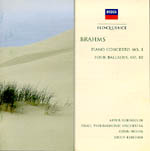Zubin Mehta’s and Arthur Rubinstein’s single recorded collaboration was made very late in the pianists life (the artist’s respective contracts made earlier joint projects impossible). At age 89, Rubinstein retained his mesmerizing romantic ardor, but due to his partial blindness and perhaps simple old age, could not longer attack the keyboard with his former ease. Thus, we have a performance of grand scope, and great intentions, but, alas, flawed execution. Despite the reported retakes, Rubinstein simply misses notes throughout the work (especially in the first movement). Zubin Mehta provides a dramatic and dark reading of the orchestral accompaniment, but the performance as a whole is a pale reflection of Rubinstein’s recording with Fritz Reiner and the Chicago Symphony on RCA. As a filler, the disc includes Julius Katchen’s cool and delicate rendition of Brahms Four Ballades. Katchen’s fingerwork is admirably pristine, but his approach sounds rather detached after Wilhelm Kempff’s more emotionally involved reading (he makes No. 2 sound like something heard in a dream-state.) Decca’s recording favors the piano in the concerto, and is a bit dry for the Ballades.
































